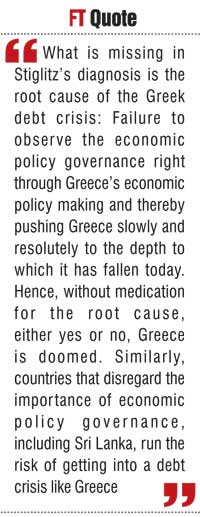Saturday Feb 21, 2026
Saturday Feb 21, 2026
Monday, 20 July 2015 00:10 - - {{hitsCtrl.values.hits}}

Greece’s problem is home-grown and its politicians, past and present, along with the people should take the blame. International creditors are responsible for its woes only to the extent of failing to make a proper assessment of the future credit risks of the country and issuing timely warning signals to Greece’s spend-loving politicians by withdrawing the fund flows.
Yes or no, Greece has to negotiate with international creditors
Greeks decided overwhelmingly against an international creditor imposed bailout programme, 61% rejecting it while only 39% saying yes, at a referendum held on 5 July. Its Finance Minister at that time, Yanis Varoufakis, hailed the results as a victory for democracy meaning that Greeks have voted against the intervention of foreign powers in its internal affairs.
But the Greek Prime Minister Alexis Tsipras was more cautious in interpreting the results. He termed them as a mandate to strengthen the hands of the government to negotiate with international creditors for a meaningful bailout programme. Thus, both ‘the no and yes vote’ carried the same message: Negotiate with international creditors and help us come out of the debt crisis.
Leading economists frowning at austerity programme
Leading economists of international fame, including Nobel Laureates like Joseph Stiglitz and Paul Krugman, have been critical of the austerity programme imposed on Greece by its international creditors five years ago. Their claim was that the bailout programme had not helped Greece to come out of its debt crisis and therefore was meaningless.
Krugman openly said that Greeks should vote against the bailout plan, while Stiglitz said the same indirectly. Thus, to the intellectual community, the ‘no’ vote for the bailout plan was an opportunity for Greeks to decide on their own destiny without the intervention of international creditors who had been termed ‘terrorists’ by the Greek Finance Minister earlier.
Referendum neither strengthened the Greek government nor weakened the creditors
But the events after the referendum had caused the euphoria in which the supporters of the no-vote campaign had been living for the time being to fizzle out. Finance Minister Yanis Varoufakis was asked to leave the post though he claimed that he did so voluntarily to pave way for a sustainable negotiation.
There was no remarkable strengthening of the hands of the government, as expected by Prime Minister Tsipras, compared with his position at pre-referendum. In the opposite, the message delivered by the Greeks did not weaken the hands of the international creditors and they remained as tough as they had been before in imposing their tough conditions.

Failure to diagnose the root cause
Joseph Stiglitz, in his essay titled ‘How I would vote in the Greek Referendum’ summed up the no-solution outcome as follows: “Neither alternative – approval or rejection of Troika’s, (that is, European Central Bank, International Monetary Fund and the European Commission) terms – will be easy and both carry huge risks”.
What is missing in Stiglitz’s diagnosis is the root cause of the Greek debt crisis: Failure to observe the economic policy governance right through Greece’s economic policy making and thereby pushing Greece slowly and resolutely to the depth to which it has fallen today. Hence, without medication for the root cause, either yes or no, Greece is doomed. Similarly, countries that disregard the importance of economic policy governance, including Sri Lanka, run the risk of getting into a debt crisis like Greece.
Economic policies should take a holistic view
Economic policy governance emerges from the mandate being used by governments to make policies to change the economic system for the benefit of the citizens. These policies have wide repercussions on the respective economies: in the short run as well as in the long run; on the people who are directly targeted by the policies as well as those who are not; on the domestic economy as well as the global economic partners and so on. Hence, when these policies are made, it is of utmost importance to consider all these aspects to minimise their harmful effects and maximise the benefits to the society.
Policies to receive wide consultation
The policy authorities are expected to follow a course of action that ensures the attainment of this vital goal of a policy. For that, they should make the policy known to everyone, give the public an opportunity to discuss and debate it, revise the policy on the basis of public’s views and implement the policy accordingly. Thus, a public policy is not something implemented by policy authorities at their discretion but a policy which receives a consensual approval from the society.
However, such a governance system requires deep and wide public consultation, toleration and accommodation of opposing views, transparency in decision making as well as in implementation and assigning clearly defined accountability for the action taken. These are subjects that come within the purview of economic policy governance.
Lack of good economic policy governance leads to disaster
If good economic policy governance practices are not adopted by a country, it may set itself on a course heading for disaster. Once that disaster has hit a country, the costs of the failed economic policies have to be borne by everybody. It is, therefore, in the interest of people themselves to close all possibilities of the occurrence of such undesired outcomes.
It has been the fashion of policy makers to assess the success of a policy in terms of the outlay incurred or the output it has produced just like assessing the Hambantota Harbour or the Mattala Airport in terms of the engineering marvels they have produced. Recently, economists were talking about the need for looking at the outcome – what change it has created – of a policy.
But today, it is viewed that the outcome of a policy is not adequate to assess its success. It is the impact of the policy that matters because impact may have added to or reduced from or left the conditions as they had been before the implementation of the policy concerned. Only the policies that would add to the prevailing conditions on a long term sustainable basis are to be welcome.
Sri Lanka’s past policies have ignored good policy governance
But policies are normally evaluated by policy makers on the basis of the outlay that has been incurred or the outputs that have been produced. At a roundtable discussion which was held at the Postgraduate Institute of Management or PIM on the launch of the book on project management by the Sri Lankan born academic – Nihal Amerasinghe – speaker after speaker stressed this point.
In the infrastructure projects that have been implemented in Sri Lanka in the recent past, only the output aspects have been highlighted to demonstrate the success of those projects, according to the participants at the roundtable discussion. Since there had not been a proper evaluation at the design stage, these projects have become ‘white elephants’ imposing enormous burdens on the country’s taxpayers. Economic policy governance requires that those who are responsible for creating such white elephants should be made accountable for the losses they have caused to the country.
Greece: Ignore policy governance and live on borrowed money
Greece has failed to observe economic policy governance throughout. It had a good credit rating due to its affiliation with the European Union, enabling it to raise money from the international markets liberally. With its high credit rating, the interest rates which it had to pay were substantially lower than the rates which it would have paid as an individual borrower country. This was not a blessing but a curse since it enabled Greece’s profligate politicians to raise money and spend on mega projects that did not bring in commensurate benefits to the country.

Attempt to regain past glory by hosting Olympic Games
One such daring enterprise was the hosting of the 2004 Olympic Games in Athens which it did simply to boost its national image. It was easy for Greek politicians to marshal the support of the masses for this extravagant enterprise on the ground that Greece was the home country of the Olympic Games and the opportunity to host it in the modern era would take Greece back to that glorious period of Greek history.
The Greek, living in the past nostalgia and being unable to assess the future risks, overwhelmingly supported the politicians without thinking twice. Hence, the so-called nation regaining enterprise was started without funds and without a plan to put that vast expenditure to the long-term wellbeing of the people.
Opportunity to host sports events is ‘losing’
The initial estimate of the construction of the Olympic stadiums and structures was some $ 1.6 billion. But, when the structures were completed, Greece ended with a total cost – 10 times of that initial estimate – of $ 16 billion according to sports economist, Andrew Zimbalist of Smith College, USA. This is not unusual for Greece because all other countries which have hosted similar sports events had cost overruns making them huge burdens to taxpayers.
Zimbalist says that winning the opportunity to host the game is ‘losing’. That is because the revenue expected on a net basis for a host country amounts to about $ 3 billion but the cost of hosting, including the construction of the infrastructure, has been enormous: Beijing, $ 40 billion and London, $ 20 billion. The infrastructure which had been viewed as a modern marvel at the time of hosting the games has not been put, in all the cases, to subsequent economic use. As a result, the whole cost of constructing the same has become a deadweight loss for the countries involved.
A recent visit to Greece’s Olympic Icons by Tony Manfred of Business Insider, Australia, has revealed that 30 of such national Olympic monuments have been abandoned totally, left to the overgrowth of weeds and shrubs and converted to ghost towns. Thus, it is not unusual for countries which have hosted such events out of borrowed money to run into the problem of repaying debt. This is exactly what happened to Greece.
In this context, Sri Lanka, a country which has to borrow even to repay its maturing public debt, losing the bid to host the 2018 Commonwealth Games in Hambantota is really a ‘win’ for the country.
Greece systematically tampering its economic data
Thus, Greece’s problem is home-grown and its politicians, past and present, along with the people should take the blame. International creditors are responsible for its woes only to the extent of failing to make a proper assessment of the future credit risks of the country and issuing timely warning signals to Greece’s spend-loving politicians by withdrawing the fund flows.
In this context, international credit rating agencies are also at fault because they had failed to alert the global community in time about the impending crisis that was brewing within the Greek economy. Greek government was also responsible for the spread of misinformation due to its release of inaccurate data relating to public debt, fiscal imbalance and debt repayments.
According to European Commission reports, the reliability of the statistics released by the Greek government had been subject to questioning since it applied for EU membership in 1999. Eurostat, EU’s statistical agency, had expressed its reservations about the reliability of the Greek statistics from 2005 to 2009 since such data had been revised substantially afterwards. Its action to improve the data reliability has been to no avail since 2004. As such, it issued a report in 2010 alleging the falsification of data and political interference in doing so. Such accusations are not limited only to Europe.
As this writer has pointed out in a number of previous articles in this series, Sri Lanka’s official statistical agency, Department of Census and Statistics, has been accused of massaging the GDP numbers and the Central Bank of giving falsified numbers on its external debt. The fault of the rating agencies, in the case of Greece as well as Sri Lanka, is the failure to notice these data tampering and make suitable revisions to the ratings they had assigned to them.
The bottomless well in Greece
Greece, after it was hit by the debt crisis in 2009, is like a bottomless well, meaning that whatever the relief granted to that country gets sunk into the earth at the bottom of the well. In 2010, a debt reliefpackage amounting to Euro 110 billion was offered to Greece to avoid default of foreign debt and meet the financial requirements till June 2013.
This package was conditional on Greece’s following an austerity programme to rescue its economy from further slippage. However, the programme was not implemented properly and after one year, Greece needed a further Euro 130 billion to come out of the financial crisis. With recession hitting the Greek economy once again and unemployment rising to 25%, the package of Euro 240 billion granted by way of relief has proved to be inadequate.
Thus, the challenge before the three institutions, nicknamed troika, supplying relief to Greece is much more severe than the challenge being faced by Greek authorities. Of them EU, led by Germany, has to make a hard choice: Whether to allow Greece to exit EU, abbreviated as Grexit, or force Greece to yield to its conditions. Both are impossible choices given the current political landscape of Europe. If Grexit is allowed, it creates a bad precedent that EU will not help a member in trouble. On the other hand, austerity cannot be imposed on Greece since its economy, in view of the current recession, cannot accommodate any more demands for austerity without fatal results.
Avoid the devil’s alternative through proactive action
This is the state of Greece today and it has pushed itself to that state by failing to adopt suitable economic policy governance measures. Its population, having enjoyed the temporary bonanza delivered to them through borrowed money, had been oblivious of the need for observing good economic policy practices.
Thus, the patient called Greece has degenerated to a state where no known medication would be effective in arresting the deteriorating conditions. Proactive action would have been taken in advance when the first symptoms were visible, as was done by the David Cameron government in Britain in 2010, to establish sound economic fundamentals in the Greek economy.
But this was not done and today, Greece is in a dilemma. It cannot avoid the painful austerity measures whether they are imposed as a condition of the bailout plan or if Greece leaves EU, as a home-grown solution. In economics, this is known as Devil’s alternative: whatever the option you follow, you have to suffer immensely.
This happened when the Greek Prime Minister Tsipras agreed on an austerity programme, not with a strengthened hand as he predicted immediately after the referendum, with the international creditors last week. Predictably, the whole of Athens was set in flames by the angry masses that had exercised their democratic rights two weeks ago. Thus, a country can ignore good economic policy governance to its own doom later one day.
Sri Lanka’s choice: Continue to ignore economic policy governance and be doomed
This is the lesson which Sri Lanka, a country that has ignored good economic policy governance throughout and hence is at the door of a serious economic crisis right now, should learn from Greece’s peril.
(W.A. Wijewardena, a former Deputy Governor of the Central Bank of Sri Lanka, can be reached at [email protected].)